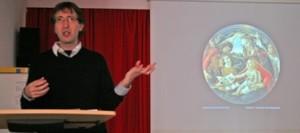
On 13 February Dr. Stefano Evangelista of Trinity College, Oxford, presented an inspiring guest lecture on Walter Pater’s vision of the Renaissance as a state of mind.
Walter Pater (1839 – 1894) was an English art and literary critic at Oxford. Although he was a shy and peaceful man, his book The Renaissance, Studies in Art and Poetry caused great controversy, shocking the established art criticism of the nineteenth century with its ahistorical and amoral conception of studying aesthetics. According to Pater, it is the real sensation of the art object that matters, instead of the application of abstract concepts or a disinterested explication through historical facts.
Dr. Evangelista introduced the students to the book and the included essays on Renaissance individuals, such as Pico della Mirandola, Botticelli and Leonardo da Vinci. Through discussion of these individual essays, it was revealed how the narrative of the essays repeatedly present a frozen and dogmatic background, representative of the Middle Ages, against which the bright and innovative characteristics of the Renaissance-man present themselves. Just as Renaissance artists breathe new life into pagan symbols and classical aesthetics, so too does Pater attempt to breathe life into the art objects of the Renaissance through his own original and intense impressions. Pater’s essays were shown by Dr. Evangelista to reenact the emergence of the Renaissance spirit itself.
Dr. Evangelista examined this tendency through specific examples, including Pater’s striking reading of Botticelli’s Venus, in which he traces the synthesis of the allegorical Christian elements in the landscape and the pagan figure of Venus. Venus appears reminiscent of the Virgin Mary, exemplifying how Botticelli injected new life into the visual depiction of Venus. This synthesis functions in light of a distinct sensibility that Pater sees at the core of the Renaissance. In Botticelli’s case, psychological expressions obtain physicality and the world is seen in a new light, free from Medieval Christianity. On this basis Dr. Evangelista provided a compelling account of Pater’s envisioning of the Renaissance state of mind, in which one is free to interpret the past, to abstract meaning from the object’s relation to the viewer and to constantly reestablish the object’s influence on aesthetic experience. Dr. Evanglista argued that “Pater does not aim to describe the art object; rather, he attempts to translate the artwork itself into language”.
Dr. Evangelista’s lecture closed by addressing the notorious conclusion of Renaissance, Studies in Art and Poetry. A manifesto of art, the conclusion advocates the Renaissance sensibility as a way of life, of experiencing the most intense and precise impressions in the shortest moments possible. One is to absorb human experiences to the fullest and to open oneself to the aesthetic quality that art can give to one’s life. The lecture ignited an energetic debate amongst students and faculty.
Stefano Evangelista is Fellow and Tutor in English at Trinity College, Oxford, and Lecturer in English at the University of Oxford. His main interests are in nineteenth-century English and comparative literature, the classical tradition, and the interface between literary and visual cultures. He is currently completing a book on British aestheticism and Ancient Greece, and is editing a volume on the reception of Oscar Wilde in Europe.
by Martin Lipman (’08, Netherlands)
